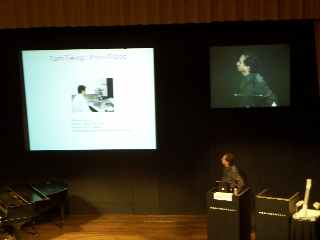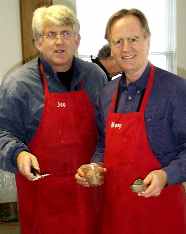We have, on balance a free press in the United States. Many other parts of the world can’t say that, and an organization in Prague is doing something about it.
More in my Sunday column.
Technology and Human Beings
 < br>
< br>
Technology’s soul is most apparent by its absence. Silicon Valley remains disturbingly preoccupied with money and velocity, the binary values of today’s tech culture.
Not here, not in Camden, Maine. Not this weekend, anyway.
I’ve been participating in a conference like few others. It’s called Pop!Tech, and it is a reaffirmation of the values that matter most in a world where soulless technology has come to play such a dominant role.
The subtitle of Pop!Tech, which took place at the beautifully restored Camden Opera House (pictured above, with MIT’s Rodney Brooks speaking), was “Being Human in the Digital Age” — an apt theme. At this gathering, technologists, educators, artists, politicians and others contemplated what really matters in this New Economy equation. People.
“How does it really affect the bottom line of your life?” asked Mike Hawley, a professor a the MIT Media Lab.
And how does it affect other people’s lives?
Each session seemed more interesting than the one before. Wonderful sparks flew when the governor of Maine, Angus King, sat on a panel with Whit Diffie, inventor of public-key encryption, and the American Civil Liberties Union’s Ira Glasser. King sounds libertarian, but is authoritarian when the mood strikes — he’s a big advocate of fingerprinting Maine’s schoolteachers.
I was struck by the number of speakers who talked about human values, the ones that truly matter. I wonder if the technologists present really heard what they were being told.
Let’s assume technology is morally neutral, said Rushworth Kidder, founder and president of the Institute for Global Ethics, based here in Maine. “I’ll grant that it is,” he said, “if you’ll grant to me that human beings engaged in technology are part of a moral community and they must make moral choices in the face of astonishing change.”
Overall, the human race is becoming more ethical, Kidder said. But is the pace of ethical improvement keeping pace with Moore’s Law? No. Witness the ability of a single individual at a keyboard to create damage on a level once reserved to nation-states.
“We may be better than our ancestors, but that may not be good enough,” Kidder said.
Questions of right and wrong are easy. It’s the conflicts between right and right — when each choice can be justified as meeting some value — that are the difficult ones, Kidder said.

Above are the principal hosts of the conference, Bob Metcalfe and John Sculley, as they served locally made ice cream during a Saturday afternoon break.
I’ll be writing more about the conference, but not until much later today.
